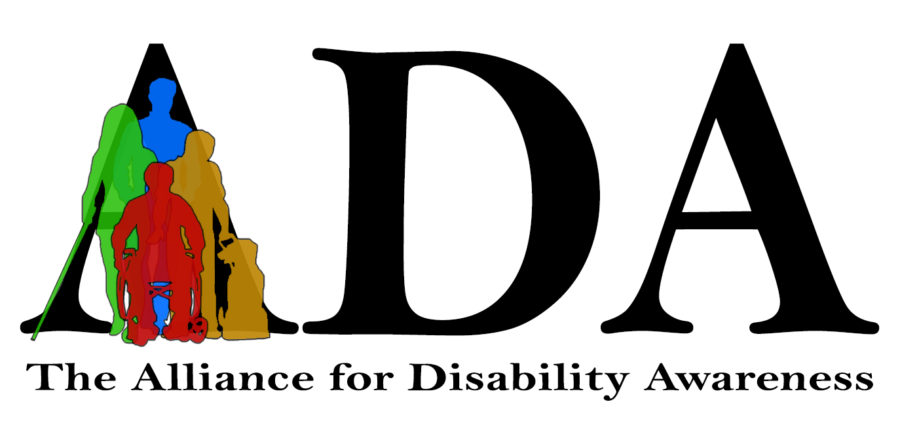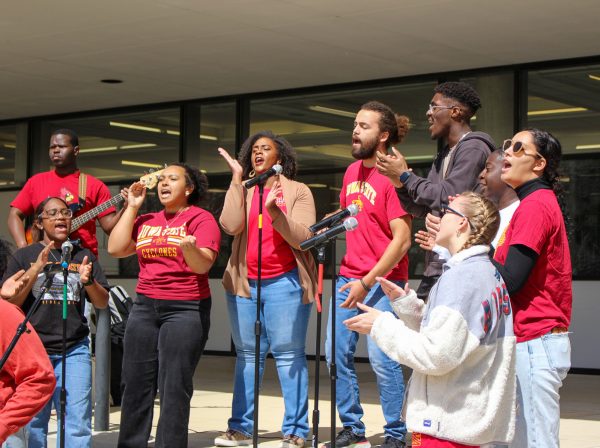‘Not accepting ableism’: Group advocates for campus accessibility
The Alliance for Disability Awareness allows students with and without disabilities to acknowledge issues facing students with disabilities on campus.
Erika Ibarra-Garibay is a graduate student who has spent the past two years at Iowa State researching ecology, evolution and organismal biology. She is also autistic and has ADHD.
As a woman who is neurodivergent, Ibarra-Garibay found Iowa State a tough community to integrate into until she joined the Alliance for Disability Awareness (ADA), where she has now taken on the role of treasurer.
“When I attended one of the very first ADA meetings, it was quite welcoming to me even though I didn’t know anyone,” Ibarra-Garibay said. “It felt like I was able to go in without any pressure to fit into any particular norm. I could just be there and be myself, and that was a big relief for me because graduate school is very hard and time-consuming.”
The Alliance for Disability Awareness is a student organization that advocates for a more accessible and flexible college experience for students with disabilities.
Composed of able-bodied students and students with disabilities, the organization is led by Macey Hofer, a senior majoring in psychology and president of the alliance, who believes the organization is a safe space on campus.
“The purpose of our organization is to promote a more accessible ISU and give people with disabilities at Iowa State a safe space to create community and discuss disability awareness topics,” Hofer said.
Ibarra-Garibay said that she struggled throughout her undergraduate degree due to the design of academia, so this organization is helping to bring awareness to other learning styles.
“Traditionally, the school system has been designed in a way that only benefits or fits one particular person, where I think this organization helps with showing and bringing awareness that not everyone thinks the same way and has the same lifestyle,” Ibarra-Garibay said.
Avery Teselle, a junior majoring in integrated studio arts, serves as vice president of the organization and said her role allows her to support Hofer and the organization while also organizing events and activities.
Teselle said that many of their meetings and events are education-centric events.
“A lot of times for meetings, we will prepare a presentation on a subject, and we’ll do a lot of collaborative discussion-type things,” Teselle said. “A lot of educational stuff. Sometimes we’ll bring guest speakers in.”
Other events and activities focus on providing a fun, relaxing space for neurodivergent or disabled students.
“In the fall, we put on Disability Awareness Week,” Hofer said. “It’s a program where we have different guest speakers. Last time we had a sparkles [cheerleading] performance […] we also do tabeling on campus to raise awareness for the variety of disabilities at Iowa State.”
The Alliance for Disability Awareness is open to all students, regardless of their disability status.
“You don’t have to be able; you don’t have to be disabled,” Teselle said. “It’s really open to anybody who’s passionate about advocating for disability.”
Hofer was motivated to join the Alliance for Disability Awareness and run for president due to her work as a caregiver.
“I have worked with people with disabilities as a caregiver for a long time, and in my future career as a speech-language pathologist, I’ll work with a lot of people with disabilities,” Hofer said. “Disability advocacy is something I’ve cared about for a long time, and I found this position as a great opportunity to expand my advocacy to a larger group of people and to just create a community with people who had the same goals and ideals as I did.”
Hofer and Teselle both encourage non-members to support this organization in a variety of ways, including attending meetings, listening to the stories of disabled students, sharing personal experiences regarding disabilities, acknowledging the privilege one may have for being able-bodied and advocating for a more accessible campus.
Teselle also said she believes the biggest thing students can do to support disabled students is to educate themselves on ableism.
“A lot of what people can do is educate themselves to some level to recognize ableism and call their friends out when they’re making ableist jokes or saying the ‘R’ word,” Teselle said. “A lot of it is just not accepting ableism.”
Ibarra-Garibay believes that despite Iowa State having a long way to go in terms of accessibility, the organization has tremendously improved her graduate school experience.
“For people who have a lot more hurdles to jump, it makes it extremely difficult for someone to excel in grad school, so going to the ADA meetings was this weight lifted, in the sense where I did not have to meet certain criteria to fit in and it was a safe space for me to do so,” Ibarra-Garibay said.
Your donation will support the student journalists of the Iowa State Daily. Your contribution will allow us to purchase equipment, send our student journalists to conferences and off-set their cost of living so they can continue to do best-in-the-nation work at the Iowa State Daily.















